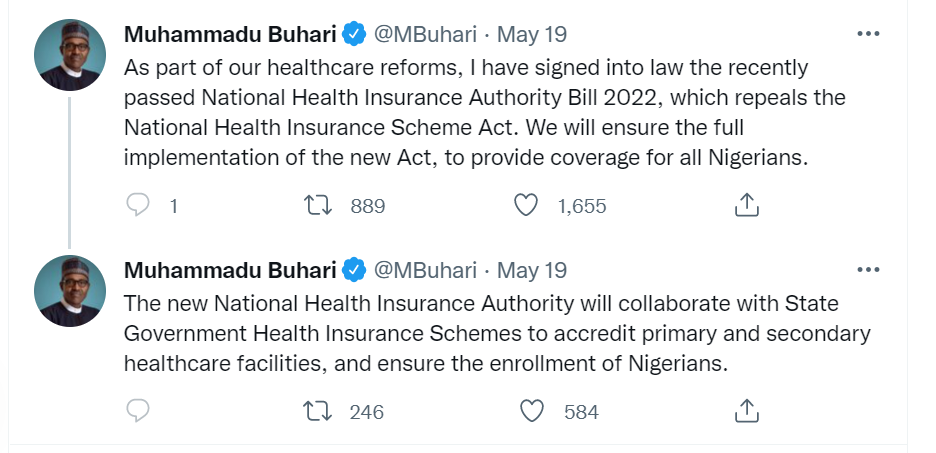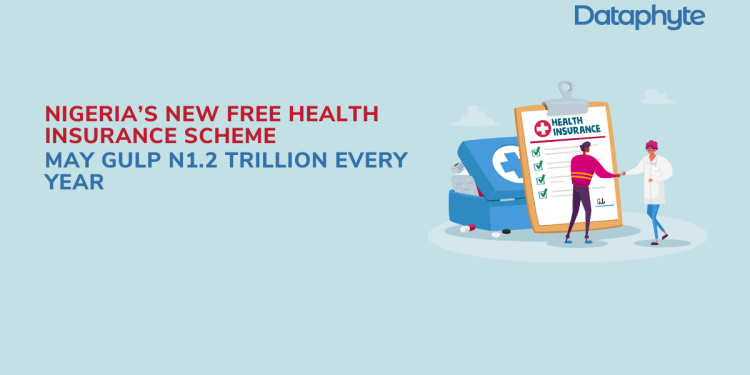President Muhammadu Buhari’s has committed to pay for the insurance premiums of 83 million Nigerians who cannot afford to pay for their health insurance premiums.
He said this while signing the National Health Insurance Authority Bill 2022 into law on 19th May 2022.
According to Mr Buhari, the new National Health Insurance Authority will partner with state government health insurance schemes to accredit primary and secondary healthcare facilities and ensure the enrollment of Nigerians.
Verifying this on his official Twitter handle, the President committed to “the full implementation of the new Act” which aims to provide health coverage for all Nigerians.

“As part of our healthcare reforms, I have signed into law the recently passed National Health Insurance Authority Bill 2022, which repeals the National Health Insurance Scheme Act. We will ensure the full implementation of the new Act, to provide coverage for all Nigerians,” he noted.
Providing more details, a spokesman of the President, Garba Shehu, quoted the President to have said that a Fund will be set up “to ensure coverage of 83 million poor Nigerians who cannot afford to pay premiums.

Earlier, in a Dataphyte report, it was noted that about 14.6% of Nigerians are unable to access adult medical services while 11.7% are unable to access child healthcare services. Another 9.5% cannot access maternal health care services.
Dataphyte also noted that 97% of Nigerians are not covered by any form of health insurance.
This lack of access has been blamed in part on the cost of accessing healthcare. Nigeria has one of the highest rates of out-of-pocket healthcare expenditures.
Besides, low government funding of healthcare has been identified as part of the challenges of achieving quality affordable healthcare services, with Nigeria consistently failing to reach the benchmark of 15% of its total budgetary allocation on healthcare.
The New Act may Gulp N1.2 trillion Annually
Going by quotes from the Nigerian Health Insurance Scheme (NHIS), the government’s aim to provide free health insurance for 83 million persons annually may cost up to N1.2 trillion naira annually.
A spokesman for the NHIS who identified himself as Umar told Dataphyte during a phone conversation that it would cost a group of 10 persons N150,000 annually to access health insurance while a family of four would pay N60,000 per year. Although it was noted that an individual would pay N45,000 annually to access health insurance.
Thus, going by the cost of a group of ten persons which puts health insurance at N15,000 per annum for a single person, Nigeria may spend at least One trillion, Two hundred and forty-five billion Naira (N1,245,000) yearly to provide health insurance for ‘83 million poor Nigerians’.
If the President really meant to “ensure the full implementation of the new Act, to provide coverage for all Nigerians”, such a huge investment in healthcare would amount to 6 times (or 600%) of the Ministry of Health’s budget of N208 billion for capital expenditure in 2022.
Already, the National Health Insurance scheme has been criticised for failing to live up to its expectations and the reasons for its establishment, which is to facilitate affordable quality healthcare for Nigerians.
Towards rejigging the Scheme for effective service delivery, the government identified and intends to address the issue of institutional corruption that has bedevilled the scheme across the years.
Some of the services currently covered by the scheme include maternity care, prescribed emergency drugs, radiology, diagnostic lab test, and emergency healthcare coverage.
Achieving the government’s target for the free health insurance scheme helps to bridge the access gap in the country, and moves Nigeria closer to achieving the sustainable development goal 3.




